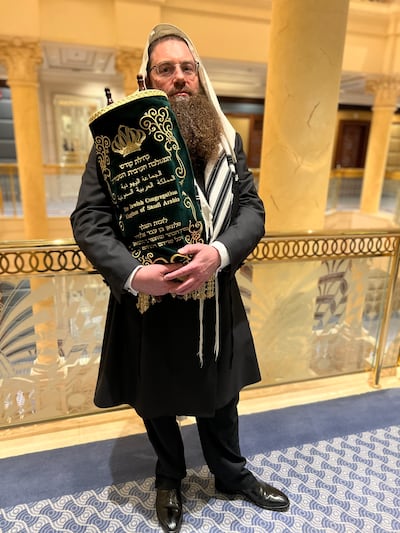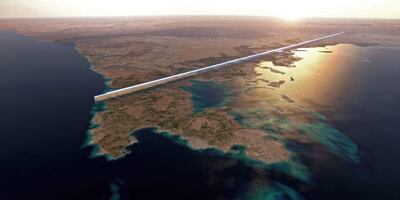For the past two years, Jacob Herzog, the self-proclaimed Chief Rabbi of Saudi Arabia, has led a Jewish centre in Riyadh, a city he has found surprisingly welcoming to people of his faith.
The American-Israeli rabbi's fascination with Saudi Arabia began in 2018 after he learnt about Neom, the country’s $500 billion futuristic city, and was introduced to Klaus Kleinfeld, the first chief executive for the project.
“The general idea of a new city with seven million people in northern Saudi Arabia, with a separate set of laws than the rest of the kingdom, sounded amazing,” Rabbi Herzog told The National.
He began speaking with Jewish consultants, architects and lawyers who were already working in Saudi Arabia, and realised that there was no spiritual centre for them.
“I started dabbling with the idea that when they start Neom, I will try to open a community and realised that with the number of expats already working there it would bring in a substantial number of Jews,” he said.
Rabbi Herzog estimated there were 1,000 Jewish people living in the kingdom at the time. He started learning more about Saudi Arabia from books, but soon realised he wanted to visit the country in person.
“I recognised I can’t use conventional wisdom in a place like Riyadh and threw away about 95 per cent of what I had learnt about the Middle East,” he said.
“I must have chucked 150 books out of my house written by people who are top sellers on The New York Times list.
"But at the end of the day, when you are living in the Middle East and see what’s going on, they are very disconnected from reality.”
After obtaining his visa, Rabbi Herzog visited Riyadh and took a trip to the downtown market and older neighbourhoods.
Dressed in his Orthodox Jewish clothes, he had friendly interactions with locals and decided that he wanted to live in Saudi Arabia with his wife and eight children.
“Jews should really think about being proud they don’t have to hide your Jewishness," Rabbi Herzog said.
"On the contrary, in a place like Saudi Arabia, where it’s a very religious society, people will appreciate and respect you more.

In addition to the Jewish centre, which is used by about 100 people in Riyadh, the rabbi also is working on finding a proper location for a ritual bath, or mikveh, for community members.
“The beauty of living in Saudi Arabia is that everybody can live the way they want, yet they are still preserving their heritage and their traditions, and they always remember that they are the custodians of the two holiest places in the Muslim faith,” Rabbi Herzog said;
He says he is not initiating interfaith dialogue, unlike in the Gulf, where there are well-established Jewish communities, and the Abrahamic Family House in Abu Dhabi.
But he has had the opportunity to meet prominent imams such as Sheikh Saad El Ghamidi.
“We are mainly there for the Jewish people and to help with their connectivity," Rabbi Herzog said.
"We are not in any way, shape or form trying to make people change their heritage or to convert. That’s not our way.
“The UAE and Saudi Arabia are two very different places and countries, geographically.
"A lot of people try to say they did it this way in the Emirates, so this the way it should be done, but that is not the case here. We are growing the need of our community within the guidelines of the government.”
US President Joe Biden's administration has played down reports of major progress in its goal of establishing normalised relations between Saudi Arabia and Israel, something Rabbi Herzog says he feels indifferent towards.
“From day one, I have separated the Israeli issue from the Jewish issue because Saudis never were anti-Semitic," he said.
"We don’t know if there is going to be an agreement or when there’s going to be an agreement. It’s not something I am banking on.
“I’m just there to help the Jewish people working there and the country in any way I can.”
Rabbi Herzog also has travelled through the West Bank, Jordan, Indonesia, Malaysia and cities such as Tehran and Hamadan in Iran.
“A lot of Jewish people, especially Americans, are always looking for the similarities between the two cultures," he said. "I’m not looking for that, I already know what are similarities are.
"We come from the same heritage and the same forefathers, so for us that’s where it begins and that is the most important thing. The rest is very superficial."


